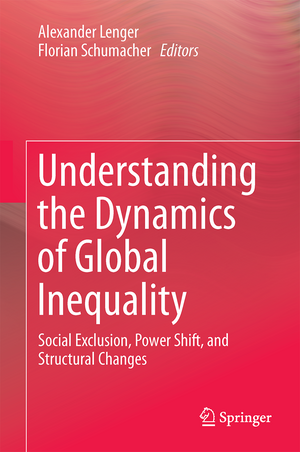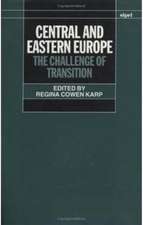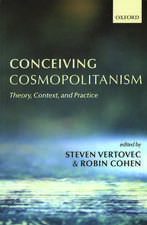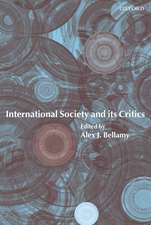Understanding the Dynamics of Global Inequality: Social Exclusion, Power Shift, and Structural Changes
Editat de Alexander Lenger, Florian Schumacheren Limba Engleză Hardback – 18 dec 2014
The contributions are subdivided into three essential fields of research: Part I analyzes the socio-economic dimension of global exclusion, highlighting in particular the impacts of internationalization and globalization processes on national social structures against the background of theoretical concepts of social inequality. Part II addresses the political dimension of global inequalities. Since the decline of the Soviet Union new regional powers like Brazil, China, India and South Africa have emerged, creating power shifts in international relations that are the primary focus of the second part. Lastly, Part III examines the structural and transnational dimension of inequality patterns, which can be concretized in the rise of globalized national elites and the emergence of multinational networks that transcend the geographical and imaginative borders of nation states.
| Toate formatele și edițiile | Preț | Express |
|---|---|---|
| Paperback (1) | 388.52 lei 6-8 săpt. | |
| Springer Berlin, Heidelberg – 11 sep 2016 | 388.52 lei 6-8 săpt. | |
| Hardback (1) | 395.85 lei 6-8 săpt. | |
| Springer Berlin, Heidelberg – 18 dec 2014 | 395.85 lei 6-8 săpt. |
Preț: 395.85 lei
Nou
Puncte Express: 594
Preț estimativ în valută:
75.75€ • 82.54$ • 63.83£
75.75€ • 82.54$ • 63.83£
Carte tipărită la comandă
Livrare economică 23 aprilie-07 mai
Preluare comenzi: 021 569.72.76
Specificații
ISBN-13: 9783662447659
ISBN-10: 3662447657
Pagini: 300
Ilustrații: XVI, 284 p. 8 illus.
Dimensiuni: 155 x 235 x 22 mm
Greutate: 0.6 kg
Ediția:2015
Editura: Springer Berlin, Heidelberg
Colecția Springer
Locul publicării:Berlin, Heidelberg, Germany
ISBN-10: 3662447657
Pagini: 300
Ilustrații: XVI, 284 p. 8 illus.
Dimensiuni: 155 x 235 x 22 mm
Greutate: 0.6 kg
Ediția:2015
Editura: Springer Berlin, Heidelberg
Colecția Springer
Locul publicării:Berlin, Heidelberg, Germany
Public țintă
ResearchCuprins
Preface.- Part I: Introduction.- Part II: Dynamics of Global Exclusion.- Part III: Global Power Shift.- Part IV: Global Structures, Networks and Inequality.
Notă biografică
Alexander Lenger is a research fellow at the collaborative research centre 1015 »Otium/Leisure«, lecturer at the institute for sociology, and research affiliate at the Global Studies Programme at Freiburg University. Previously he was research fellow at the department for business ethics at the Goethe University Frankfurt and director of the Global Studies Programme at Freiburg University. His research interests include theories of social inequality, science studies, economic sociology, globalization processes, business ethics and social justice research.
Florian Schumacher is Sociologist and Literary Scholar at Freiburg University and Director of the Global Studies Programme (Freiburg, Bangkok, Buenos Aires, Cape Town, New Delhi). His research focuses on social structure, globalisation, the comparison of national identities and the sociology of Pierre Bourdieu.
Florian Schumacher is Sociologist and Literary Scholar at Freiburg University and Director of the Global Studies Programme (Freiburg, Bangkok, Buenos Aires, Cape Town, New Delhi). His research focuses on social structure, globalisation, the comparison of national identities and the sociology of Pierre Bourdieu.
Textul de pe ultima copertă
Despite the fact that the globalization process tends to reinforce existing inequality structures and generate new areas of inequality on multiple levels, systematic analyses on this very important field remain scarce. Hence, this book approaches the complex question of inequality not only from different regional perspectives, covering Africa, Asia, Europe, Latin and Northern America, but also from different disciplinary perspectives, namely cultural anthropology, economics, ethnology, geography, international relations, sociology, and political sciences.
The contributions are subdivided into three essential fields of research: Part I analyzes the socio-economic dimension of global exclusion, highlighting in particular the impacts of internationalization and globalization processes on national social structures against the background of theoretical concepts of social inequality. Part II addresses the political dimension of global inequalities. Since the decline of the Soviet Union new regional powers like Brazil, China, India and South Africa have emerged, creating power shifts in international relations that are the primary focus of the second part. Lastly, Part III examines the structural and transnational dimension of inequality patterns, which can be concretized in the rise of globalized national elites and the emergence of multinational networks that transcend the geographical and imaginative borders of nation states.
The contributions are subdivided into three essential fields of research: Part I analyzes the socio-economic dimension of global exclusion, highlighting in particular the impacts of internationalization and globalization processes on national social structures against the background of theoretical concepts of social inequality. Part II addresses the political dimension of global inequalities. Since the decline of the Soviet Union new regional powers like Brazil, China, India and South Africa have emerged, creating power shifts in international relations that are the primary focus of the second part. Lastly, Part III examines the structural and transnational dimension of inequality patterns, which can be concretized in the rise of globalized national elites and the emergence of multinational networks that transcend the geographical and imaginative borders of nation states.
















